
It wasn’t the best start for Ayesha Jalal. The historian looked deeply frenzied at 11 am, frantically searching for a document on her flash drive and unable to understand why Karachiites could not start anything on time.
Either it’s early morning or a lack of earnestness in Karachi, she said to a friend, as around 10 people waited for her session on “Manto and partition stories” to start at the Karachi Literature Festival. “I am coming from the literary festival in Jaipur and my God was it difficult to reach the panel there,” she said, drawing the inevitable comparison between India and Pakistan.
But then a cry from the background changed her mood: “Ayesha Jalal!”
“Sanam Bhutto!” she cried back as the two women fell in to a hug the likes of which can only be exchanged by long-lost friends.
Bhutto made her presence felt. Talking to Jalal about her estranged family members, she quipped rather loudly, “I have not been allowed into 70 Clifton for the last 12 years.”
As Bhutto and Jalal expressed their dismay about Pakistani unpunctuality, the room finally started filling up around 20 minutes after the scheduled time.
The moderator, scholar Dr Mohammad Raza Kazmi, stepped to the podium and stayed there for a rather long 10 minutes. He dwelled on Saadat Hasan Manto’s writings about partition, barely looking up from his papers and remained undeterred by the shrilly sounds emitted by the microphone that were visibly disturbing the much-acclaimed historian.
Introduced as Pakistan’s greatest and most controversial historian, Jalal finally stepped on stage. She spoke eloquently, but like a true academic used diction that the audience was widely unfamiliar with. She started her session by reading an excerpt from one of Manto’s writings about partition and moved on to an autobiographical account of the 20th century writer, talking extensively about his friends, his passions and his inherent love for humanity.
Jalal discussed at length Manto’s ‘extraordinary friendships’ with writers Ismat Chughtai and Rajinder Singh Bedi and actors Ashok Kumar and Shaam. His relationship with Shaam scarred the great short story writer for life after the actor once confessed, in the wake of Hindu-Muslim riots, that he could consider killing Manto, she said.
For Manto, human beings had becomes slaves of bigotry, religious passion and animal instinct during partition, but despite the prevalent hypocrisies and social ills, his belief in humanity came through in his writings.
Jalal added that Manto found himself a misfit in Pakistan and due to an absence of opportunities in the new country, he was drawn to alcohol. “People think Manto was always an alcoholic, but he wasn’t. He was always a heavy drinker; it was Pakistan that made him an alcoholic.”
Jalal’s session was a preview of sorts to her book on Manto and partition, which is due to be published this year by Princeton University Press. Indeed, it was a measure of the respect people have for Jalal that the lecture was attended by Pakistan’s biggest names, including Kishwar Naheed, Arfa Syeda, Fouzia Saeed, Rasool Bux Rais and Ayesha Siddiqa.
The historian gave much insight into the great author’s life, but what was deeply missing was a discussion on Manto’s writings, which was what the session seemed to have promised.
Due to a shortage of time, only one question was asked at the session. But it was enough to irk the historian. When someone from the audience asked why the issue of partition was lost in Jalal’s session, she annoyingly said: “You can’t get everything in a 55-minute lecture. You want me to tell to you about the politics of partition? I wrote about it 30 years ago.”
Published in The Express Tribune, February 12th, 2012.
COMMENTS (4)
Comments are moderated and generally will be posted if they are on-topic and not abusive.
For more information, please see our Comments FAQ














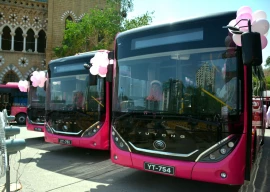
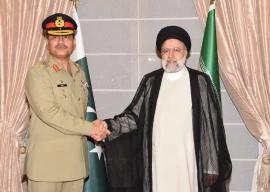










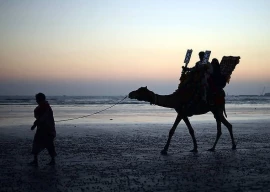
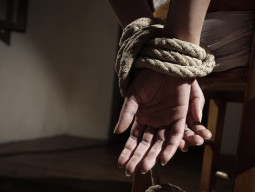
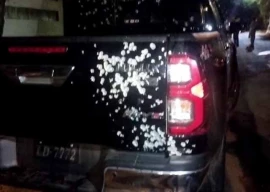



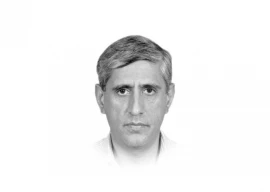

Manto's Toba Tek Singh was in our Syllabus of literature.But stripped of its historical context and taught by an ignoramus,we or at least I couldn't reach the profound thought of text.It took all of past 45 years to have a feel of confusin and sadness that that sikh madman felt! Imagine a family of Zamindar from Bihar,one brother decides to migrate to a homeland of muslims to Dhaka from where he escapes in 1971 via his native village in Bihar.he is now an enemy where as his other brother's son who decided to stay back is an IAS officer charged with capturing enemy,his own uncle.Inothertimes he would have been owner of half of parental property,would have tended graves of his ancestors.But he was helped in escaping to Karachi via Nepal. In karachi twenty years later his son is killed in target killing or military operation and he even doesn't get to see his body.This Zamindar's son is finally found dead as a beggar and buried by Edhi in an un namedgrave. One person,three nations and an un named grave,dead as beggar,fanily torn asunder by their own!
I don't know if it I am the only one making this observation, but all the ET articles pertaining to KLF have a pejorative tone. I wonder if the people are aware of the effort and time that went into organizing the event. I think they should cut the organizers some slack and highlight the engaging dialogues that took place as opposed the glitches and delays in schedule.
wow! awesome. i really miss KLF. can we have a literature festival in lahore too.